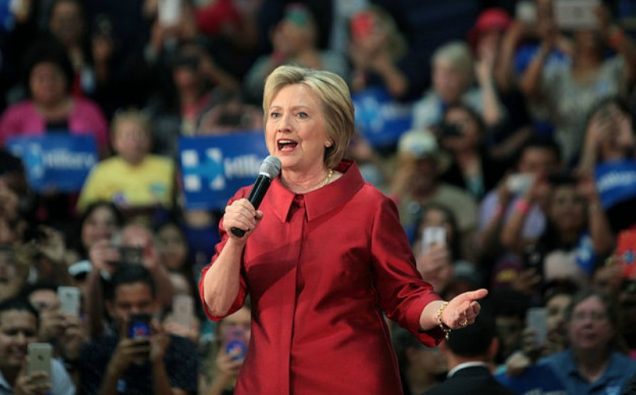
By late evening on June 7, Hillary Clinton will likely have secured 2323 delegates number to claim Democratic nomination for presidential race, thanks mainly to her expected victory in New Jersey primary, as well as overwhelming support of super delegates.
But what about other primaries on the same day, particularly California, the Golden state with 475 delegates at stake? And why will the result in the blue state matter for the former secretary of state who has faltered frequently against Party rival Bernie Sanders?
Apart from the obvious addition of a large number of delegates, Clinton needs to prove a point – that she has regained her winning momentum after a deeply critical State Department watchdog report that faulted her for using a private email account as America’s top diplomat.
Secondly, Clinton has to win big in order to reassure her backers that she has recovered from recent stumbles and would hit the road running in the presidential race against likely opponent Trump.
Thirdly, she must craft a powerful message for the voters, particularly the millennial generation of Democrats that has embraced Sanders’ call for equality, and fixing the Wall Street ways of doing business, perceived to be detrimental to the interests of the Main Street.
On the same count, Trump has been able to exploit anger, anxiety and frustration among Republicans about job losses, economic fragility and trade issues.
Clinton’s real test appears to in messaging in a way that convinces voters that she is the one who cares the most about challenges facing average Americans. Thanks to Trump’s outbursts against foreign countries and Sanders’ lack of international experience, Clinton figures pretty successfully on the checklist of foreign policy credentials.
On the positive side, she also has a large reservoir of support among African American, Latino and Asian communities to build on.
So, coming primaries offer both opportunity and challenge for Clinton. While New Jersey is expected to be a smooth sailing, it is the Californian battlefield that would test the mettle of both Clinton and Sanders.
A poll this week said Hillary Clinton and Bernie Sanders are in a tight race in the Democratic presidential primary in California, while Donald Trump has the support of most Republican primary likely voters.
In potential November matchups, Trump trails both Clinton and Sanders, according to findings in a statewide survey carried out by the Public Policy Institute of California.
The survey reveals that among Democratic primary likely voters, 46 percent support Clinton and 44 percent support Sanders. These voters include Democrats and independents who say they will vote in the Democratic primary. Clinton has a slight lead over Sanders among registered Democrats (49% to 41%).
In line with general trends, voters age 45 and older are more likely to support Clinton (59%), while younger voters are more likely to favor Sanders (66%). Both men (46% Sanders, 42% Clinton) and women (49% Clinton, 42% Sanders) are divided.
The findings are a cause of much concern for the Clinton camp as she was expected to have an easy ride in California, and Sanders’ surge has made California primary look like a contest that could go anyway.
While Clinton is assured of massive super delegates support, she must win California to move forward as a winner and confident candidate. A loss, on other hand, will be a devastating blow to her campaign.
Jack Pitney, a professor of government at Claremont McKenna College, told National Public Radio this week that psychological advantage matters crucially.
“She wants to end the primary campaign on a high note, and losing California would end it on a low note,” he told NPR. “She wins the nomination, but loses the psychological warfare to Bernie Sanders.”













